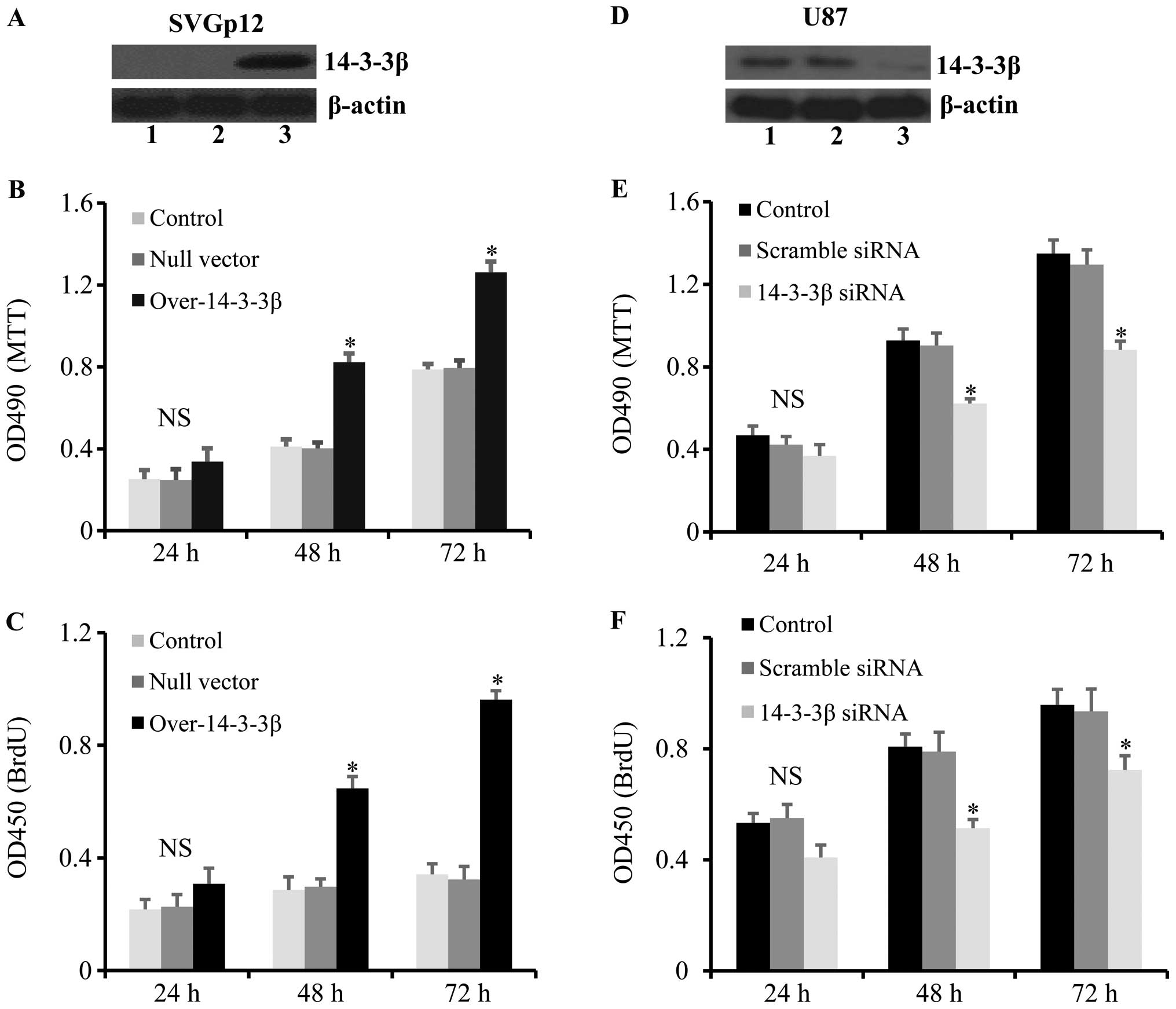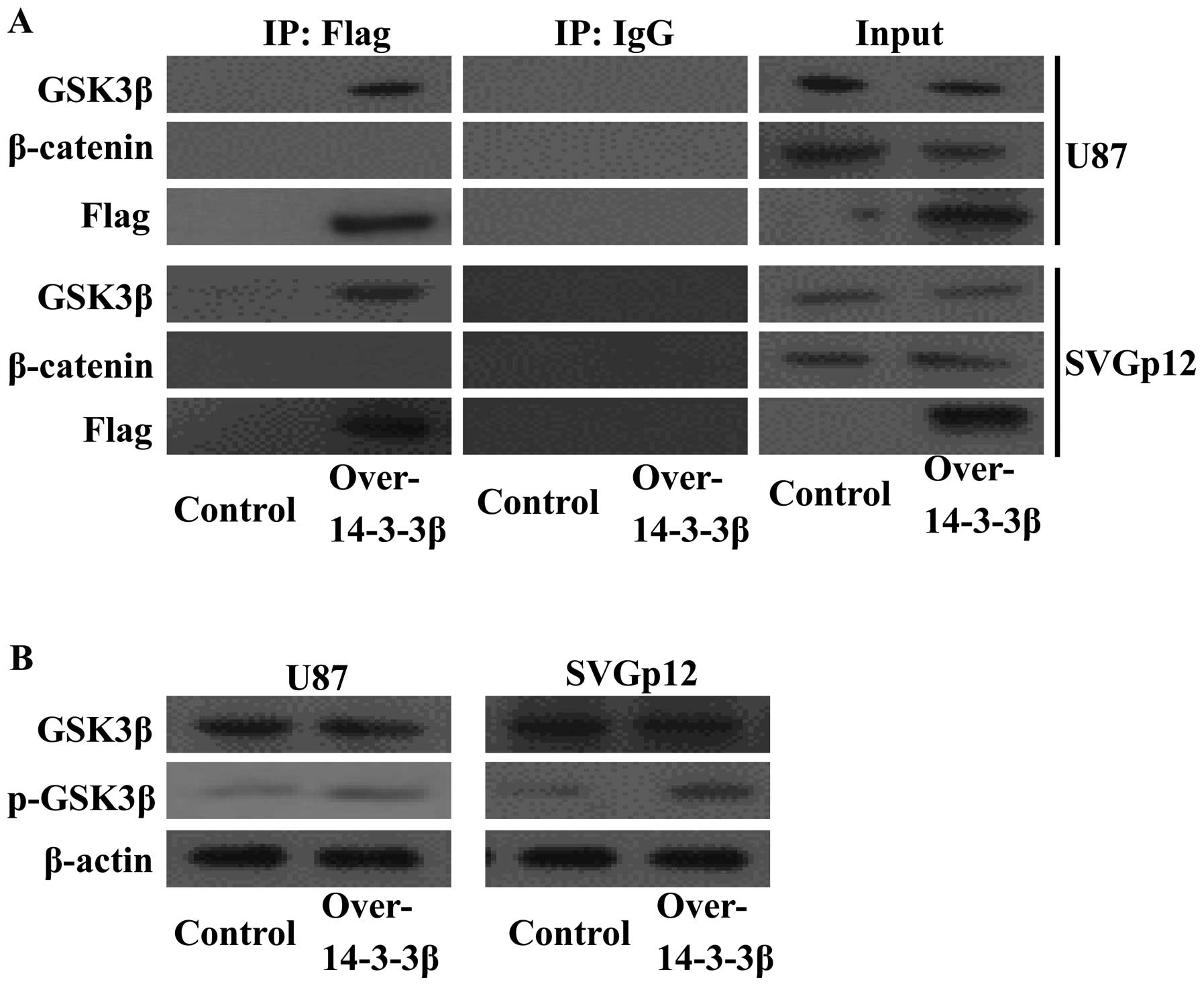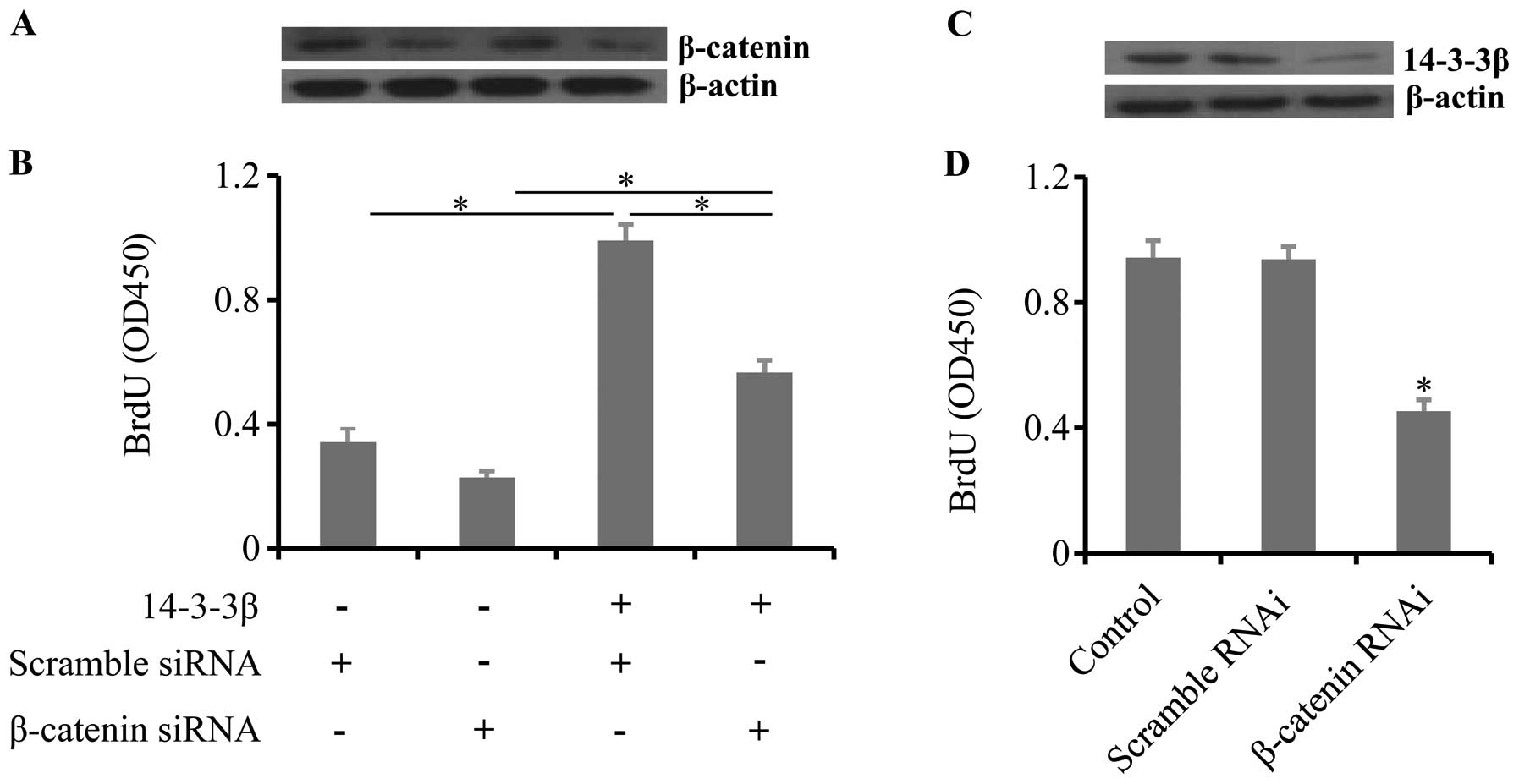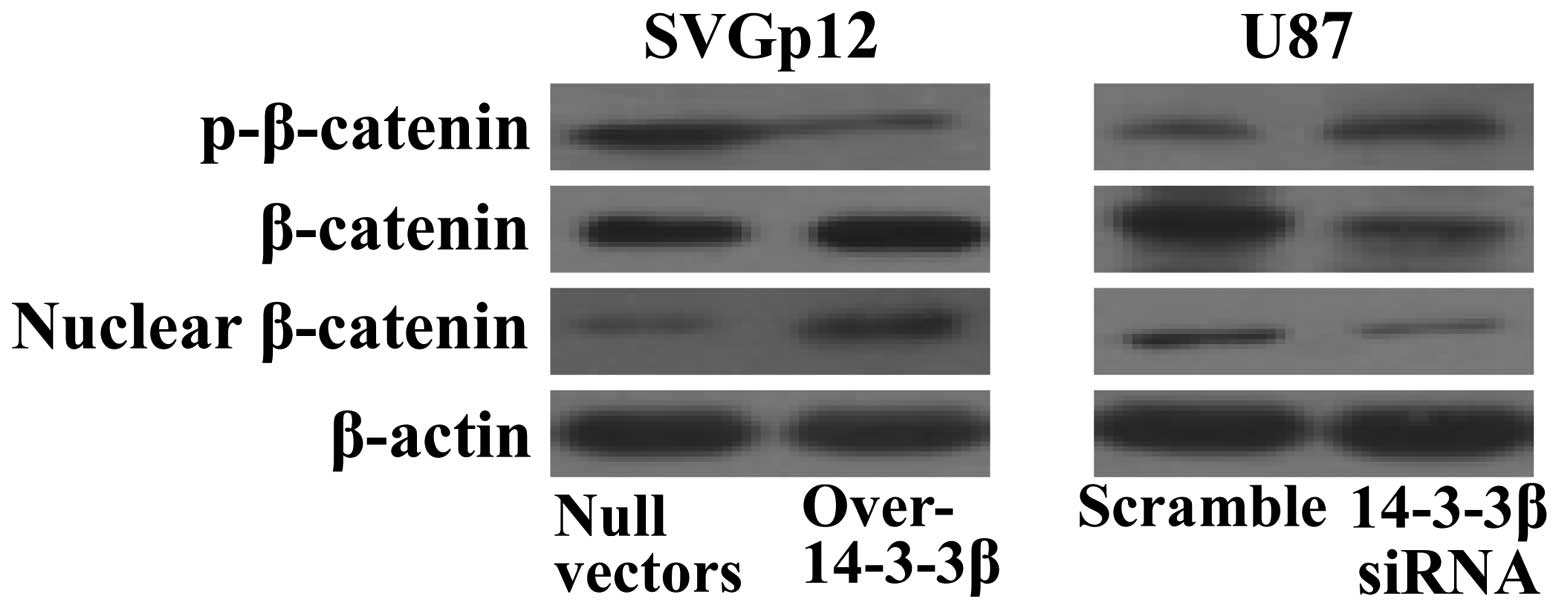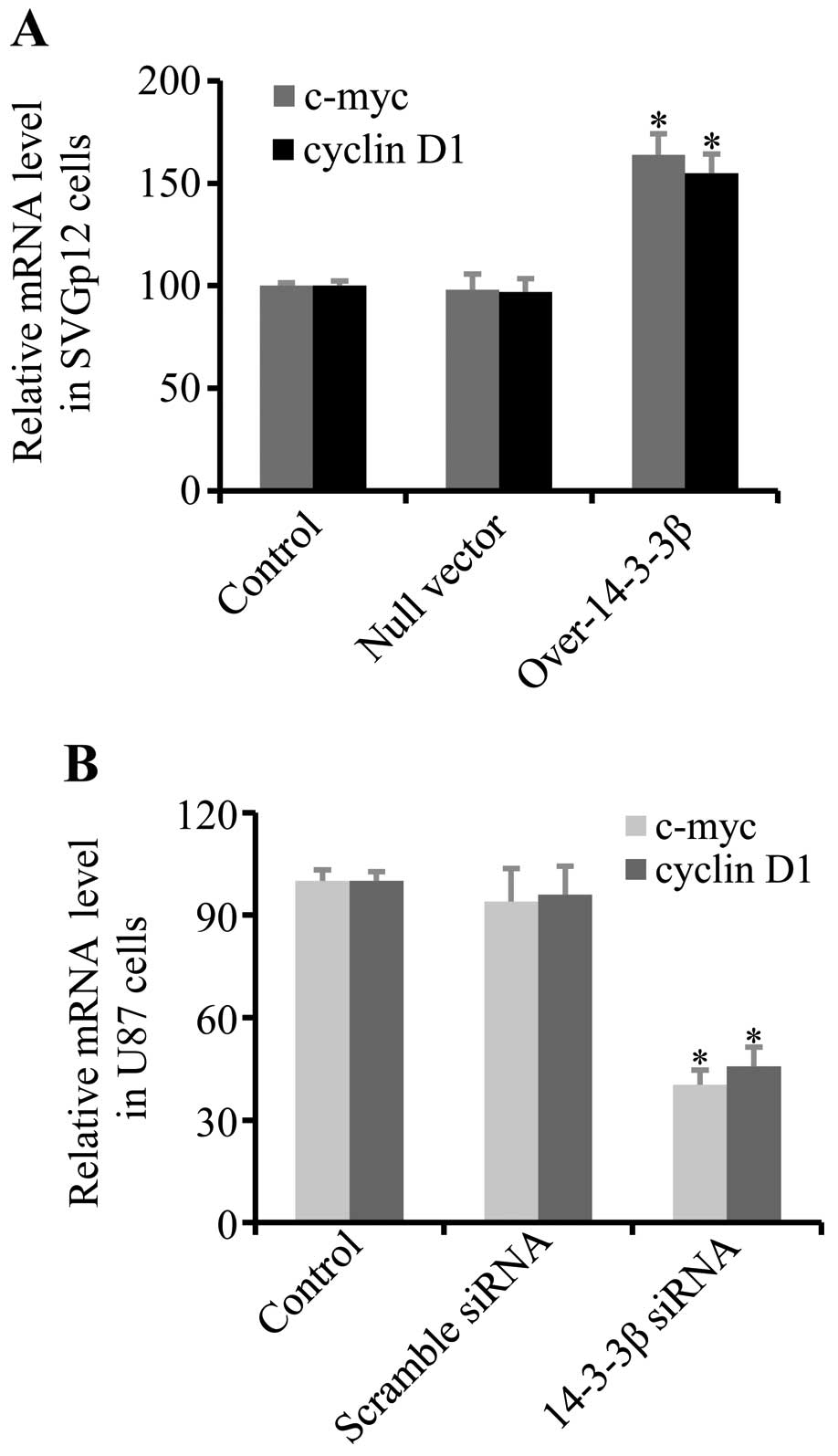|
1
|
van Hemert MJ, Steensma HY and van Heusden
GP: 14-3-3 proteins: key regulators of cell division, signalling
and apoptosis. Bioessays. 23:936–946. 2001.PubMed/NCBI
|
|
2
|
Baldin V: 14-3-3 proteins and growth
control. Prog Cell Cycle Res. 4:49–60. 2000. View Article : Google Scholar
|
|
3
|
Fu H, Subramanian RR and Masters SC:
14-3-3 proteins: structure, function, and regulation. Annu Rev
Pharmacol Toxicol. 40:617–647. 2000.
|
|
4
|
Aitken A: Functional specificity in 14-3-3
isoform interactions through dimer formation and phosphorylation.
Chromosome location of mammalian isoforms and variants. Plant Mol
Biol. 50:993–1010. 2002.
|
|
5
|
Hermeking H: The 14-3-3 cancer connection.
Nat Rev Cancer. 3:931–943. 2003.
|
|
6
|
Wilker E and Yaffe MB: 14-3-3 proteins - a
focus on cancer and human disease. J Mol Cell Cardiol. 37:633–642.
2004. View Article : Google Scholar : PubMed/NCBI
|
|
7
|
Tzivion G, Gupta VS, Kaplun L and Balan V:
14-3-3 proteins as potential oncogenes. Semin Cancer Biol.
16:203–213. 2006. View Article : Google Scholar
|
|
8
|
Neal CL, Yao J, Yang W, et al: 14-3-3ζ
overexpression defines high risk for breast cancer recurrence and
promotes cancer cell survival. Cancer Res. 69:3425–3432. 2009.
|
|
9
|
Neal CL, Xu J, Li P, et al: Overexpression
of 14-3-3ζ in cancer cells activates PI3K via binding the p85
regulatory subunit. Oncogene. 31:897–906. 2012.
|
|
10
|
Zang D, Li X and Zhang L: 14-3-3ζ
overexpression and abnormal β-catenin expression are associated
with poor differentiation and progression in stage I non-small cell
lung cancer. Clin Exp Med. 10:221–228. 2010.
|
|
11
|
Li Z, Zhao J, Du Y, et al: Down-regulation
of 14-3-3ζ suppresses anchorage-independent growth of lung cancer
cells through anoikis activation. Proc Natl Acad Sci USA.
105:162–167. 2008.
|
|
12
|
Luo J, Feng J, Lu J, et al: Aberrant
methylation profile of 14-3-3 sigma and its reduced
transcription/expression levels in Chinese sporadic female breast
carcinogenesis. Med Oncol. 27:791–797. 2010. View Article : Google Scholar
|
|
13
|
Frasor J, Chang EC, Komm B, et al: Gene
expression preferentially regulated by tamoxifen in breast cancer
cells and correlations with clinical outcome. Cancer Res.
66:7334–7340. 2006. View Article : Google Scholar : PubMed/NCBI
|
|
14
|
Sun B, Zhang S, Zhang D, et al:
Identification of metastasis-related proteins and their clinical
relevance to triple-negative human breast cancer. Clin Cancer Res.
14:7050–7059. 2008. View Article : Google Scholar : PubMed/NCBI
|
|
15
|
Ramirez JL, Rosell R, Taron M, et al:
14-3-3σ methylation in pretreatment serum circulating DNA of
cisplatin-plus-gemcitabine-treated advanced non-small-cell lung
cancer patients predicts survival: the Spanish Lung Cancer Group. J
Clin Oncol. 23:9105–9112. 2005.
|
|
16
|
Muslin AJ and Xing H: 14-3-3 proteins:
regulation of subcellular localization by molecular interference.
Cell Signal. 12:703–709. 2000. View Article : Google Scholar : PubMed/NCBI
|
|
17
|
Pawson T and Nash P: Protein-protein
interactions define specificity in signal transduction. Genes Dev.
14:1027–1047. 2000.PubMed/NCBI
|
|
18
|
Chohan G, Pennington C, Mackenzie JM, et
al: The role of cerebrospinal fluid 14-3-3 and other proteins in
the diagnosis of sporadic Creutzfeldt-Jakob disease in the UK: a
10-year review. J Neurol Neurosurg Psychiatry. 81:1243–1248.
2010.PubMed/NCBI
|
|
19
|
Ladogana A, Sanchez-Juan P, Mitrova E, et
al: Cerebrospinal fluid biomarkers in human genetic transmissible
spongiform encephalopathies. J Neurol. 256:1620–1628. 2009.
View Article : Google Scholar : PubMed/NCBI
|
|
20
|
Larska M, Polak MP, Zmudzinski JF and
Torres JM: Comparison of mRNA expression levels of selected genes
in the brain stem of cattle naturally infected with classical and
atypical BSE. Brain Res. 1351:13–22. 2010. View Article : Google Scholar : PubMed/NCBI
|
|
21
|
Cao L, Cao W, Zhang W, et al:
Identification of 14-3-3 protein isoforms in human astrocytoma by
immunohistochemistry. Neurosci Lett. 432:94–99. 2008. View Article : Google Scholar : PubMed/NCBI
|
|
22
|
Yang X, Cao W, Lin H, et al:
Isoform-specific expression of 14-3-3 proteins in human
astrocytoma. J Neurol Sci. 276:54–59. 2009. View Article : Google Scholar : PubMed/NCBI
|
|
23
|
Mwangi S, Anitha M, Fu H, Sitaraman SV and
Srinivasan S: Glial cell line-derived neurotrophic factor-mediated
enteric neuronal survival involves glycogen synthase kinase-3β
phosphorylation and coupling with 14-3-3. Neuroscience.
143:241–251. 2006.PubMed/NCBI
|
|
24
|
Doble BW and Woodgett JR: GSK-3: tricks of
the trade for a multi-tasking kinase. J Cell Sci. 116:1175–1186.
2003. View Article : Google Scholar : PubMed/NCBI
|
|
25
|
Grimes CA and Jope RS: The multifaceted
roles of glycogen synthase kinase 3beta in cellular signaling. Prog
Neurobiol. 65:391–426. 2001. View Article : Google Scholar : PubMed/NCBI
|
|
26
|
Ciani L and Salinas PC: WNTs in the
vertebrate nervous system: from patterning to neuronal
connectivity. Nat Rev Neurosci. 6:351–362. 2005. View Article : Google Scholar : PubMed/NCBI
|
|
27
|
Polakis P: The oncogenic activation of
β-catenin. Curr Opin Genet Dev. 9:15–21. 1999.
|
|
28
|
Mulholland DJ, Dedhar S, Wu H and Nelson
CC: PTEN and GSK3β: key regulators of progression to
androgen-independent prostate cancer. Oncogene. 25:329–337.
2006.
|
|
29
|
Kotliarova S, Pastorino S, Kovell LC, et
al: Glycogen synthase kinase-3 inhibition induces glioma cell death
through c-MYC, nuclear factor-κB, and glucose regulation. Cancer
Res. 68:6643–6651. 2008.PubMed/NCBI
|
|
30
|
Davis FG, McCarthy BJ, Freels S, Kupelian
V and Bondy ML: The conditional probability of survival of patients
with primary malignant brain tumors: surveillance, epidemiology,
and end results (SEER) data. Cancer. 85:485–491. 1999. View Article : Google Scholar : PubMed/NCBI
|
|
31
|
DeAngelis LM: Brain tumors. N Engl J Med.
344:114–123. 2001. View Article : Google Scholar : PubMed/NCBI
|
|
32
|
van den Bent MJ, Hegi ME and Stupp R:
Recent developments in the use of chemotherapy in brain tumours.
Eur J Cancer. 42:582–588. 2006.PubMed/NCBI
|
|
33
|
Livak KJ and Schmittgen TD: Analysis of
relative gene expression data using real-time quantitative PCR and
the 2(-Delta Delta C(T)) method. Methods. 25:402–408. 2001.
View Article : Google Scholar : PubMed/NCBI
|
|
34
|
Krieghoff E, Behrens J and Mayr B:
Nucleo-cytoplasmic distribution of β-catenin is regulated by
retention. J Cell Sci. 119:1453–1463. 2006.
|
|
35
|
Polakis P: Wnt signaling in cancer. Cold
Spring Harb Perspect Biol. 4:pii: a008052. 2012. View Article : Google Scholar
|
|
36
|
Han DC, Rodriguez LG and Guan JL:
Identification of a novel interaction between integrin β1 and
14-3-3β. Oncogene. 20:346–357. 2001.
|
|
37
|
Toshima JY, Toshima J, Watanabe T and
Mizuno K: Binding of 14-3-3β regulates the kinase activity and
subcellular localization of testicular protein kinase 1. J Biol
Chem. 276:43471–43481. 2001.
|
|
38
|
Wang Y, Jacobs C, Hook KE, et al: Binding
of 14-3-3β to the carboxyl terminus of Wee1 increases Wee1
stability, kinase activity, and G2-M cell population. Cell Growth
Differ. 11:211–219. 2000.
|
|
39
|
Takihara Y, Matsuda Y and Hara J: Role of
the β isoform of 14-3-3 proteins in cellular proliferation and
oncogenic transformation. Carcinogenesis. 21:2073–2077. 2000.
|
|
40
|
Sugiyama A, Miyagi Y, Komiya Y, et al:
Forced expression of antisense 14-3-3β RNA suppresses tumor cell
growth in vitro and in vivo. Carcinogenesis. 24:1549–1559.
2003.
|
|
41
|
Musholt TJ, Brehm C, Hanack J, von
Wasielewski R and Musholt PB: Identification of differentially
expressed genes in papillary thyroid carcinomas with and without
rearrangements of the tyrosine kinase receptors RET and/or NTRK1. J
Surg Res. 131:15–25. 2006. View Article : Google Scholar : PubMed/NCBI
|
|
42
|
Zeng Y, Li Y, Chen RS, et al:
Overexpression of xCT induces up-regulation of 14-3-3β in Kaposi’s
sarcoma. Biosci Rep. 30:277–283. 2010.PubMed/NCBI
|
|
43
|
Qi W, Liu X, Qiao D and Martinez JD:
Isoform-specific expression of 14-3-3 proteins in human lung cancer
tissues. Int J Cancer. 113:359–363. 2005. View Article : Google Scholar : PubMed/NCBI
|
|
44
|
Chiang CW, Harris G, Ellig C, et al:
Protein phosphatase 2A activates the proapoptotic function of BAD
in interleukin-3-dependent lymphoid cells by a mechanism requiring
14-3-3 dissociation. Blood. 97:1289–1297. 2001. View Article : Google Scholar : PubMed/NCBI
|
|
45
|
Kockeritz L, Doble B, Patel S and Woodgett
JR: Glycogen synthase kinase-3 - an overview of an over-achieving
protein kinase. Curr Drug Targets. 7:1377–1388. 2006. View Article : Google Scholar : PubMed/NCBI
|
|
46
|
Kaidanovich-Beilin O, Milman A, Weizman A,
Pick CG and Eldar-Finkelman H: Rapid antidepressive-like activity
of specific glycogen synthase kinase-3 inhibitor and its effect on
β-catenin in mouse hippocampus. Biol Psychiatry. 55:781–784.
2004.PubMed/NCBI
|
|
47
|
Li J, Mizukami Y, Zhang X, Jo WS and Chung
DC: Oncogenic K-ras stimulates Wnt signaling in colon cancer
through inhibition of GSK-3β. Gastroenterology. 128:1907–1918.
2005.
|
|
48
|
Welsh GI and Proud CG: Glycogen synthase
kinase-3 is rapidly inactivated in response to insulin and
phosphorylates eukaryotic initiation factor eIF-2B. Biochem J.
294:625–629. 1993.PubMed/NCBI
|
|
49
|
Berg D, Holzmann C and Riess O: 14-3-3
proteins in the nervous system. Nat Rev Neurosci. 4:752–762. 2003.
View Article : Google Scholar
|
|
50
|
Mhawech P: 14-3-3 proteins - an update.
Cell Res. 15:228–236. 2005. View Article : Google Scholar : PubMed/NCBI
|
|
51
|
Chang TC, Liu CC, Hsing EW, et al: 14-3-3σ
regulates β-catenin-mediated mouse embryonic stem cell
proliferation by sequestering GSK-3β. PLoS One. 7:e401932012.
|
|
52
|
Goñi-Oliver P, Avila J and Hernández F:
Calpain regulates N-terminal interaction of GSK-3β with 14-3-3ζ,
p53 and PKB but not with axin. Neurochem Int. 59:97–100.
2011.PubMed/NCBI
|
|
53
|
Gurusamy N, Watanabe K, Ma M, et al:
Glycogen synthase kinase 3β together with 14-3-3 protein regulates
diabetic cardiomyopathy: effect of losartan and tempol. FEBS Lett.
580:1932–1940. 2006.
|
|
54
|
Kikuchi A, Yamamoto H, Sato A and
Matsumoto S: New insights into the mechanism of Wnt signaling
pathway activation. Int Rev Cell Mol Biol. 291:21–71. 2011.
View Article : Google Scholar : PubMed/NCBI
|















